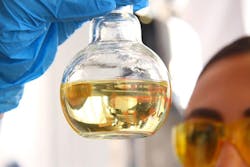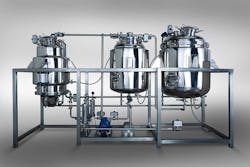Marijuana Manufacturing: Gold Rush & Oil Boom Rolled into One
When there's a boom in any industry, you can do one of two things. Chase after quick riches—or run a business to supply the fortune seekers. In 2013, Vitaly Mekk chose the latter, leaving the dispensary side of the medical marijuana industry to manufacture the large patented automated machines that use ethanol to extract the valuable cannabinoids and terpenes, the liquid gold buried under the leafy plant matter. It’s a fairly young (legal) industry, but there is historical precedence.
"The people who made the most money were the ones selling the shovels at the time of the gold rush," Mekk, the CEO of Capna Technologies, points out.
It's the kind of advice you may find in a fortune cookie, but it played out for real in 1848 San Francisco. Savvy shop owner Sam Brannan bought up all the pick axes and mining supplies in town, the vital equipment all those starry-eyed prospectors in town would need. He controlled the prices, and parlayed the ensuing profits into real estate and eventually became California's first millionaire.
Through fully integrated lab, manufacturing, and end-use verticals, Capna is positioned for a similar gambit at the onset of this new green gold rush, as the global (legal) marijuana industry, which was $9.3 billion in 2016, will hit $146 billion by 2025. And it isn't going to be driven by boutique dispensaries selling glass jars of fluffy nuggets, but by extracting the cannabinoids as oil. In this form, the cannabinoids (psychoactive THC and non-psychoactive CBD) and terpenes become exponentially more versatile, used in vape pen cartridges, edibles, topical creams and supplements. Vaping the THC from an electric delivery device is thought to be safer than inhaling the flower (i.e. smoking a joint), while CBD is considered to hold a wide range of potential health benefits, from relieving pain and anxiety to being an anti-inflammatory. The terpenes provide the flavor and aroma, from basil to mango, while also assisting in the entourage effect, a chemical phenomenon that boosts the effects of the cannabinoids.
CBD oil revenue specifically is expected to grow from $591 million to $22 billion in 2022, according to Brightfield, a cannabis market research firm.
"I think it's the future," says Mekk, whose company makes both extraction machines and manufactures vape pens via The Bloom Brand. "In the next three to five years, oil-based products are probably going to own 40 to 50% of market.
And that market keeps growing like, well, a weed. Marijuana is fully legal in 11 states (and Washington D.C.), is medically legal and/or decriminalized in 24 others, while fully illegal in 15. Canada has also legalized the controversial substance. Because of the exploding market, cannabis product manufacturers will have trouble keeping up with high demand while keeping overhead low.
Mekk says the biggest issue is efficiency. Consistency and scalability are also important concerns. In short, Capna and every other cannabis processor, or doing the most manufacturing things out there: trying to pull every last ounce of profit out of their plant.
The problem comes from drawing out the oil. One does not simply squeeze the oil from the bud as from an orange peel. It requires highly controlled extraction, using a solvent to strip the desired compounds from the plant matter. Some extracting systems use butane because of the low cost, though that has a high degree of volatility. A safer, more popular option is supercritical (cold liquid) CO2.
Capna looked into CO2 method, which Mekk calls a "very lengthy process." It takes 8-10 hours to do one run of 2 to 3 lb. (.9 to 1.3 kg), as undesirable chlorophyll, fats or waxes can add unpleasant tastes and dilute potency, so they must be purified through a process called winterization. After all that time and effort, Mekk says the average yield per pound of marijuana flower is about 1.6 to 2.1 oz. of cannabinoid concentrate. For Canucks, that would be 45-60g for every 450g of plant material.
In 2015, Capna co-founder and current CDO, Gene Galyuk, meanwhile, innovated a new way to extract the desirable compounds using ethanol.
"It was very difficult to achieve a high purity extract with CO2 extraction technology," Galyuk explains. "Once it was established that we needed a new extraction method, we designed it around Ethanol, [which is] is renewable, edible, and non-explosive: all things required for food grade extraction!”
The secret is chilling the gas to make it cryo ethanol.
"At low temperatures, ethanol becomes less aggressive, but still maintains its efficiency," Mekk says. It's polarity keeps the fats and waxes from being absorbed into the solution.
Capna released a system called the Ethos-6 that could do about 7 lb. (3.1 kg) in 40 minutes. That's about 84 lb. in an eight-hour shift. Retail prices vary by market, but CAPNA says an ROI can be achieved running 300 to 500 lb., or as little as 3.5 shifts, according to their numbers.
“With ethanol vs. C02, we’re seeing similar results — while ethanol is more efficient, effective, safe to handle and has a relatively low environmental footprint, it is perhaps not ideal for high-volume production,” said Keith Merker, CEO of WeedMD Inc to Benzinga.com.
Last November, Capna addressed those scalability concerns with the Atles. The automated three-vessel system processes 90 lb. (40.8 kg) per hour. The equipemnt requires 20 x 10 x 9 ft. of clear space for safe operation.
Atles uses positive and negative pressure to wash the plant material with the ethanol that was chilled by liquid nitrogen. The ethanol strips the cannabinoids, terpenes and flavonoids—"the good stuff," as Mekk call it. This liquid flows through a 30 micron filter and recirculates over the biomass. After that, the ethanol/oil concentrate is pushed to the collection vessel. The worker then pulls a cart under the material tank to collect the plant material soaking with ethanol. If the processor has Capna's CERES centrifuge, they can reclaim more than 98% of that ethanol. This can process 15 lb. in 15 min. (including loading and unloading).
The final result is extracting 98.6% of those oil, which comprises about 10% of the plant material's volume. Capna says that for 90 lb., you should yield about 8.8 lb. (4 kg).
The Bloom Brand division uses a modified Atles to produce its line of flavorful products, from classics like Maui Wowie to the newer, terrifyingly named "Green Crack." The names are as silly as you'd overhear at a Long Beach surf shop, but they are scientifically validated due to the consistent process and the terpene composition reads like the back of a Napa Valley wine label.
"This technology allows us to produce great tasting, consistent, products that are rich in flavor and carry strong effects identical to their flower counterparts," Galyuk says.
While magnitudes more complex than a shovel, that tech, and the overall business model, have Capna prepared to dig in for the long-term as more companies, and even the Federal government, succumb to reefer madness. A farm bill signed by President Trump made industrial hemp (<0.3% THC) legal, though the FDA considers CBD illegal. The winds may be about to change, as the FDA plans to discuss CBD regulations this April.
About the Author
John Hitch
Senior Editor
John Hitch writes about the latest manufacturing trends and emerging technologies, including but not limited to: Robotics, the Industrial Internet of Things, 3D Printing, and Artificial Intelligence. He is a veteran of the United States Navy and former magazine freelancer based in Cleveland, Ohio.
Questions or comments may be directed to: [email protected]



